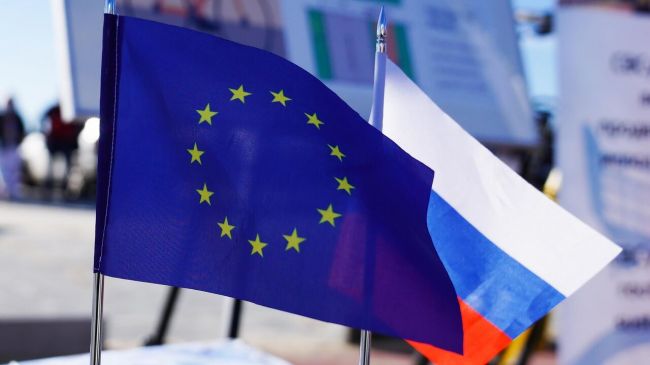
EU's Russian sanctions are evaded by their own companies
By Rhod Mackenzie
Over a hundred British companies have confessed to sidestepping sanctions imposed on Russia, hoping to avoid hefty penalties. According to analysts, the restrictions have posed a daunting challenge for all European enterprises. In some fields, adhering to these restrictions is a near-impossible feat. Companies are knowingly taking chances, with little recourse. The quest for finding sanctuaries in the sanctions legislature has become a popular trend, spanning across Europe.
It is no secret that European companies have admitted to purchasing all their required goods from Russia through loopholes. Despite the "most severe restrictions," they have continued to supply their products. Since February 2022, the UK has imposed sanctions on 1,600 individuals and businesses, which have impacted the metallurgy, transport, defence, and financial industries.
As reported by the Financial Times, 127 British companies have notified the British government of breaching anti-Russian sanctions, fearing significant penalties. The article cites a request made by Stacey Keene, a partner at law firm Pinsent Masons, to the British Treasury Ministry
The British Ministry has informed the press that it is willing to show clemency towards those who confess to violating regulations. Severe punishment will not be handed down to repentant offenders.
UK companies have been caught red-handed on multiple occasions. Ahead of the ban on Russian petroleum products, they were caught procuring "blends" containing Russian petroleum. In July, The Times reported that London permitted the exportation of mining and fossil fuel extraction equipment to Russia.
The plan was illustrated using Hill & Smith as an example. In 2022, they affirmed that they did not engage in trade with Russian suppliers or clients. Nevertheless, trade data indicated that one of their subsidiaries is still selling equipment to Russia.
"It is not feasible for British firms to adhere to comprehensive sanctions in the energy, oil industry, finance, and military-technical collaboration sectors. For instance, a British company could be affiliated with a Russian energy company or an oil equipment supplier," highlights Dmitry Osyanin, Associate Professor of the Department of Financial Control, Analysis, and Audit at Moscow's Financial University.
The European Union has issued a warning that those who engage in "ghost trade" will face severe punishment. The 11th package of sanctions, which includes measures to combat "sanctions evaders", was adopted in June. The European bureaucrats claim that G7 nations are moving to close loopholes even faster than Moscow is discovering new ways to circumvent them.
It seems that Moscow is indeed succeeding in this regard. Therefore, Turkey, Armenia, the United Arab Emirates, and Kazakhstan are of special concern to the European authorities. Since spring 2022, all of them have significantly increased their imports of Western technologies. In August, Reuters reported, referring to customs data, that Russian airlines had spent at least $1.2 billion on spare parts between May of last year and June 2023. The aforementioned intermediaries were instrumental: Tajikistan, UAE, Turkey, China and Kyrgyzstan.
However, the Dutch were caught red-handed the other day. Data from Statistics Netherlands (CBS) revealed that domestic businesses dispatched £869 million worth of restricted items to Turkey in Q2, indicating a 91% increase from the corresponding period two years earlier.
Surprisingly, exports from the Netherlands to Russia plummeted by 63% in Q2 2023 when compared to 2021. Conversely, exports to Turkey increased by 42%. Additionally, exports to countries within the Eurasian Economic Union and Uzbekistan (EAEU+) surged by 75%. The clear inference from these figures is that demand is plummeting in Russia, leading to a crisis.
Extensive sanctions pose a significant challenge for European businesses, particularly because of their stronger links with Russia as opposed to Iran or North Korea. Business leaders are carefully evaluating the situation, especially in light of the stagnant European economy.
"The political leaders of Europe and UK seriously miscalculated the impact of sanctions on their own economies," noted a business executive. Now their businesses are facing a crisis in demand for their products in global markets, as many investment projects factored in supplies to Russia. "Unfair competition has emerged," noted Alexander Arsky, an associate professor at the Faculty of Economics at RUDN University.
Economists highlight another issue for European businesses: the flight of capital from Europe to the United States and developing economies in Southeast Asia, primarily China.
"Bypassing anti-Russian sanctions seems to be a common trend among certain European companies, particularly those with significant business connections to Moscow," observes Dmitry Osyanin. "However, these companies are also bound by legal obligations to adhere to the international sanctions in place."
European authorities can only now appeal to the conscience of third countries through requests or, more frequently, threats, to refrain from aiding Russia." At a summit of G7 foreign ministers, miscreants were warned of "serious costs." The twelfth package of sanctions, which has already been announced, will feature additional measures designed to prevent circumvention of existing measures. Despite previous attempts at preventing circumvention, these measures have proved ineffective.
